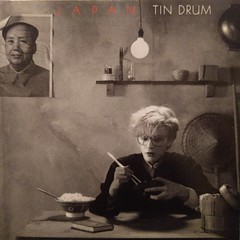
Tin Drum was the last studio record from Japan and it's quite possibly the band's best record. It has a greater emphasis on sounds from the Far East sound including Orientalist influences (I think I read that on Wikipedia). I wonder if the word Orientalist is outmoded now. On the other hand, the cover image leaves no doubt that Oriental was a theme.
The record includes a re-recording of The Art of Parties, on of the singles from a total of four released. I can't say it better than the people at Sputnik Music:
Tin Drum is an intricate collage of arty soundscapes and exotic instrumentation. There are no trashy glam flourishes, no awkward Bryan Ferry posturing. This is an album with its own voice; with every member confident in their role, and not a sound out of place. With communist China as a loose concept, the album is crammed with polyrhythmic percussion (excellently performed by Steve Jansen) and traditional oriental instruments that invoke influences without falling into the trap of becoming a cheap pastiche. Xylophones and Mick Karn's fretless bass give it all an organic, off-kilter feel, yet Richard Barbieri's electronics twist an icy knife into the arrangements to present a clash of human warmth with desolate technology, reinforcing the Red Army concept and the images of rural peasants struggling to survive amidst the new order. 'The Art of Parties' opens the album and launches straight into some rollicking, warped percussive effects, but has enough space left to ensure they don't take over, or suppress David Sylvian's wonderfully unique vocals. He has finally found his confidence here, his words flowing gracefully over the top of all the hollow clanks and synth washes of songs like 'Visions Of China' and 'Cantonese Boy'. But even when he's absent, as on the gorgeous instrumental 'Canton', you don't lose interest; you just get drawn into the strange, fractured sounds even more. [source]
No comments:
Post a Comment